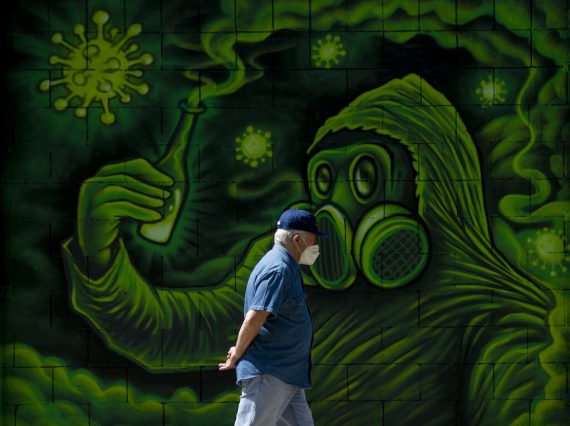Ever since the World Health Organization (WHO) declared the new Coronavirus, COVID-19, a global pandemic on March 11, 2020, the world has witnessed an unprecedented myriad of disasters and crises that have captivated the global attention. As of 1 June, 2020, there are approximately 3 million active cases, 3.2 million recoveries and more than 374,000 deaths worldwide – and continuing.
Italy, Spain, France, Iran, Brazil, Russia, the U.K. and the U.S. have become global epicenters of the pandemic with thousands of people succumbing to the virus as it spread like a bush fire across the world claiming many lives. In the U.S., COVID-19 has spread like in no other place baffling Donald Trump administration. More crucially, the virus is also spreading in Africa with countries like Kenya and South Africa imposing curfews on their citizens.
Immigrants in camps have been hit hard by this pandemic; working-class families who cannot afford to stay home have been devastated; the elderly have been hit hard the most as they are neglected and left to face the virus alone; all the while, 1.2 million super-rich left Paris for their Villas in the countryside.
Writing this opinion piece in a university dormitory where I have been self-quarantined for weeks, while following the global news with anxiety, uncertainty, and fear, I have become more introspective and meditative each day about this pandemic. Equally, on a global scale, I believe it is time for reflection.

VIDEO: Politics Today | “Change is Today”
Never has such a global crisis engulfed the world since World War II, and it’s not over yet. So, what are the lessons we have learned so far from this global pandemic that has bought the world to a standstill? One lesson that we learn from this pandemic is that financial markets, people and politics do not fare well during times of crises – chaos, confusion, uncertainty, and fear have gripped the whole world. Even though governments are ensuring their citizens are safe, people are isolating themselves in-doors to help flatten the Coronavirus curve, the pandemic risk seems set to extend into summer.
Catastrophes are not only for the invisible “others”
The Coronavirus pandemic has revealed how societies in the Global North are not prepared both psychologically and physically for any spontaneous crises and dangers. The panic, chaos, and confusion epitomized by the masses raiding and emptying supermarket shelves in the early weeks have made apparent how these societies have been caught off-guard by the virus. In addition to this, government and health institutions have also been rendered helpless in tackling the crisis, especially in Iran, Spain, the US, France, Italy, and the UK.
Decades of neo-liberal market-oriented policies have reduced states’ and governments’ capacity in service delivery in essential sectors like health and elderly care.
At the root of this is an implicit perception that catastrophes, sufferings, refugees, diseases, wars, and famines are only for the poor and undeveloped societies of the “third” world. For decades, the world has ‘otherized’ catastrophes and human tragedies to those who live in the fringes of the capitalist global order.
The crack epidemic and HIV AIDS crisis were for blacks. Cholera was only for the Haitians when it claimed almost 300,000 lives in the 2010 earthquake. Ebola was for Africans. Wars and migrations were for Iraqis, Yemenis, Syrians, and Afghanis. Othering human tragedies has rendered the “developed” world unprepared and clueless in the face of the current pandemic.
Recommended
The COVID-19 pandemic offers us a good lesson: catastrophes that create havoc with people’s lives have no ethnicity, class, geography or borders. We all have to collaborate and find solutions for all catastrophes and crises in every corner of the world.
Times to re-invest in public goods and services
Another very significant lesson that the world is learning the hard way – as a result of over-stretched medical resources – is that governments should heavily re-invest in public service delivery. Unfortunately, decades of neo-liberal market-oriented policies have reduced states’ and governments’ capacity in service delivery in essential sectors like health and elderly care. Indeed, at the center of many countries’ debacle in tackling the virus lie poor health infrastructure and service delivery to their citizens. Many are also raising concerns that the U.S.’s privatized health system is structurally incapable of dealing with the pandemic due to rigid bureaucracy and bankrupting costs leaving millions of people unable to access healthcare.
It is time for a universal healthcare system coupled with efficient service delivery in the health sector as in the case of Germany, Taiwan, and Turkey who have mitigated the casualties of the virus. This is also a wake-up call to African countries and other nations, that have been implementing the International Monetary Fund (IMF) and World Bank development-oriented austerity measures for decades, to restructure their priorities and re-invest again in public services, primarily in health.
More importantly, critical institutions like the World Health Organization (WHO) and other transnational organizations that fight infectious diseases, should be strengthened. President Trump’s recent tirade against WHO and the subsequent halting of funds to this critical organization at a time of a global pandemic is untimely and unfortunate. It is time for cooperation and solidarity, not scapegoating and blame-games.
A world in need of humanity, solidarity, and cooperation
If there is a lesson that we should take from this global pandemic, it is that we dearly need humanity, solidarity, and cooperation during this crisis and when it comes to an end. The global community has to come together in this anxious and fearful era. It is time to cast aside politics, Islamophobia and racism against Chinese and Asian people, which have increased since the pandemic. It is a time for people to help their communities, societies, and states to transcend borders and support each other.
Kenyans distributing food and aid to the daily laborers that live in the slums of Nairobi who were affected by the curfews, Japan offering warm support to China at the height of the crisis in Wuhan, Turkey sending aid to Iran, Italy, Spain, and the Balkans, and Somalia sending 20 doctors to Italy, are a great start to governments collaborating positively during the crisis, which can be built upon in the future.
In the coming post-pandemic world, we need a new global paradigm and modus operandi that will better equip the world to deal with such crises, and not repeat the mistakes of today. We must reflect about inequality in every sector of our societies; say no to racism, hate and fear-mongering spread by resurgent populist right-wing nationalists; tackle misinformation and fake news; invest in science and technology that foster humanity’s well-being and progress and not only military power; counter-narratives that undermine the dangers of global warming and the looming climate change crisis. Above all, we need to devise mechanisms to ensure global solidarity, cooperation and support during this crisis and also in the coming post-pandemic world.





